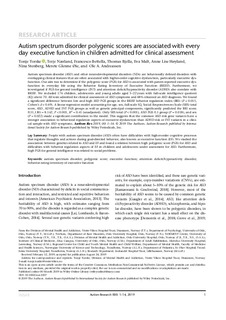| dc.contributor.author | Torske, Tonje | |
| dc.contributor.author | Nærland, Terje | |
| dc.contributor.author | Bettella, Francesco | |
| dc.contributor.author | Bjella, Thomas | |
| dc.contributor.author | Malt, Eva Albertsen | |
| dc.contributor.author | Høyland, Anne Lise | |
| dc.contributor.author | Stenberg, Nina | |
| dc.contributor.author | Øie, Merete Glenne | |
| dc.contributor.author | Andreassen, Ole Andreas | |
| dc.date.accessioned | 2020-01-17T07:06:04Z | |
| dc.date.available | 2020-01-17T07:06:04Z | |
| dc.date.created | 2019-09-30T13:46:04Z | |
| dc.date.issued | 2019 | |
| dc.identifier.citation | Autism Research | nb_NO |
| dc.identifier.issn | 1939-3792 | |
| dc.identifier.uri | http://hdl.handle.net/11250/2636717 | |
| dc.description.abstract | Autism spectrum disorder (ASD) and other neurodevelopmental disorders (NDs) are behaviorally defined disorders with overlapping clinical features that are often associated with higher‐order cognitive dysfunction, particularly executive dysfunction. Our aim was to determine if the polygenic score (PGS) for ASD is associated with parent‐reported executive dysfunction in everyday life using the Behavior Rating Inventory of Executive Function (BRIEF). Furthermore, we investigated if PGS for general intelligence (INT) and attention deficit/hyperactivity disorder (ADHD) also correlate with BRIEF. We included 176 children, adolescents and young adults aged 5–22 years with full‐scale intelligence quotient (IQ) above 70. All were admitted for clinical assessment of ASD symptoms and 68% obtained an ASD diagnosis. We found a significant difference between low and high ASD PGS groups in the BRIEF behavior regulation index (BRI) (P = 0.015, Cohen's d = 0.69). A linear regression model accounting for age, sex, full‐scale IQ, Social Responsiveness Scale (SRS) total score, ASD, ADHD and INT PGS groups as well as genetic principal components, significantly predicted the BRI score; F(11,130) = 8.142, P < 0.001, R2 = 0.41 (unadjusted). Only SRS total (P < 0.001), ASD PGS 0.1 group (P = 0.018), and sex (P = 0.022) made a significant contribution to the model. This suggests that the common ASD risk gene variants have a stronger association to behavioral regulation aspects of executive dysfunction than ADHD risk or INT variants in a clinical sample with ASD symptoms. Autism Res 2019. © 2019 International Society for Autism Research, Wiley Periodicals, Inc. | nb_NO |
| dc.language.iso | eng | nb_NO |
| dc.publisher | John Wiley & Sons | nb_NO |
| dc.rights | Attribution-NonCommercial-NoDerivatives 4.0 Internasjonal | * |
| dc.rights.uri | http://creativecommons.org/licenses/by-nc-nd/4.0/deed.no | * |
| dc.title | Autism spectrum disorder polygenic scores are associated with every day executive function in children admitted for clinical assessment | nb_NO |
| dc.type | Journal article | nb_NO |
| dc.type | Peer reviewed | nb_NO |
| dc.description.version | publishedVersion | nb_NO |
| dc.source.journal | Autism Research | nb_NO |
| dc.identifier.doi | 10.1002/aur.2207 | |
| dc.identifier.cristin | 1731497 | |
| dc.description.localcode | © 2019 The Authors. Autism Research published by International Society for Autism Research published by Wiley Periodicals, Inc. This is an open access article under the terms of the Creative Commons Attribution‐NonCommercial‐NoDerivs License, which permits use and distribution in any medium, provided the original work is properly cited, the use is non‐commercial and no modifications or adaptations are made. | nb_NO |
| cristin.unitcode | 194,65,35,5 | |
| cristin.unitcode | 1920,1,0,0 | |
| cristin.unitname | RKBU Midt-Norge - Regionalt kunnskapssenter for barn og unge - psykisk helse og barnevern | |
| cristin.unitname | Barne- og ungdomsklinikken | |
| cristin.ispublished | true | |
| cristin.fulltext | original | |
| cristin.qualitycode | 1 | |

